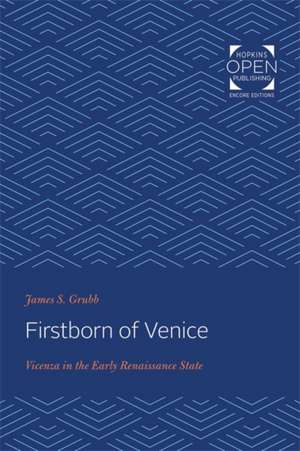Firstborn of Venice – Vicenza in the Early Renaissance State: The Johns Hopkins University Studies in Historical and Political Science
Autor James S. Grubben Limba Engleză Paperback – 13 ian 2020
In Firstborn of Venice James Grubb tests commonplace attributes of the Renaissance state through a rich case study of society and politics in fifteenth-century Vicenza. Looking at relations between Venetian and local governments and at the location of power in Vicentine society, Grubb reveals the structural limitations of Venetian authority and the mechanisms by which local patricians deflected the claims of the capital. Firstborn of Venice explores issues that are political in the broadest sense: legal institutions and administrative practices, fiscal politics, the consolidation of elites, ecclesiastical management, and the contrasting governing ideologies of ruler and subjects.
-- "Speculum"
Din seria The Johns Hopkins University Studies in Historical and Political Science
-
 Preț: 218.65 lei
Preț: 218.65 lei -
 Preț: 173.69 lei
Preț: 173.69 lei -
 Preț: 259.31 lei
Preț: 259.31 lei -
 Preț: 238.19 lei
Preț: 238.19 lei -
 Preț: 351.09 lei
Preț: 351.09 lei -
 Preț: 376.53 lei
Preț: 376.53 lei -
 Preț: 353.00 lei
Preț: 353.00 lei -
 Preț: 235.39 lei
Preț: 235.39 lei -
 Preț: 353.77 lei
Preț: 353.77 lei -
 Preț: 320.83 lei
Preț: 320.83 lei -
 Preț: 257.40 lei
Preț: 257.40 lei -
 Preț: 351.09 lei
Preț: 351.09 lei -
 Preț: 442.30 lei
Preț: 442.30 lei -
 Preț: 354.35 lei
Preț: 354.35 lei -
 Preț: 260.27 lei
Preț: 260.27 lei -
 Preț: 354.35 lei
Preț: 354.35 lei -
 Preț: 244.51 lei
Preț: 244.51 lei -
 Preț: 352.03 lei
Preț: 352.03 lei -
 Preț: 463.93 lei
Preț: 463.93 lei -
 Preț: 356.64 lei
Preț: 356.64 lei -
 Preț: 279.77 lei
Preț: 279.77 lei -
 Preț: 337.37 lei
Preț: 337.37 lei -
 Preț: 250.86 lei
Preț: 250.86 lei -
 Preț: 245.49 lei
Preț: 245.49 lei -
 Preț: 251.61 lei
Preț: 251.61 lei -
 Preț: 243.76 lei
Preț: 243.76 lei -
 Preț: 353.38 lei
Preț: 353.38 lei -
 Preț: 477.82 lei
Preț: 477.82 lei -
 Preț: 350.66 lei
Preț: 350.66 lei -
 Preț: 229.94 lei
Preț: 229.94 lei -
 Preț: 354.14 lei
Preț: 354.14 lei -
 Preț: 267.51 lei
Preț: 267.51 lei -
 Preț: 350.12 lei
Preț: 350.12 lei -
 Preț: 353.38 lei
Preț: 353.38 lei -
 Preț: 237.81 lei
Preț: 237.81 lei -
 Preț: 228.76 lei
Preț: 228.76 lei -
 Preț: 237.59 lei
Preț: 237.59 lei -
 Preț: 246.35 lei
Preț: 246.35 lei -
 Preț: 351.65 lei
Preț: 351.65 lei -
 Preț: 446.05 lei
Preț: 446.05 lei -
 Preț: 307.19 lei
Preț: 307.19 lei -
 Preț: 243.76 lei
Preț: 243.76 lei -
 Preț: 283.15 lei
Preț: 283.15 lei -
 Preț: 238.74 lei
Preț: 238.74 lei - 24%
 Preț: 340.46 lei
Preț: 340.46 lei - 23%
 Preț: 185.52 lei
Preț: 185.52 lei - 24%
 Preț: 486.63 lei
Preț: 486.63 lei - 25%
 Preț: 153.94 lei
Preț: 153.94 lei
Preț: 351.47 lei
Nou
Puncte Express: 527
Preț estimativ în valută:
67.26€ • 69.82$ • 56.09£
67.26€ • 69.82$ • 56.09£
Carte tipărită la comandă
Livrare economică 24 martie-07 aprilie
Preluare comenzi: 021 569.72.76
Specificații
ISBN-13: 9781421431871
ISBN-10: 1421431874
Pagini: 266
Dimensiuni: 151 x 229 x 16 mm
Greutate: 0.4 kg
Editura: Johns Hopkins University Press
Seria The Johns Hopkins University Studies in Historical and Political Science
ISBN-10: 1421431874
Pagini: 266
Dimensiuni: 151 x 229 x 16 mm
Greutate: 0.4 kg
Editura: Johns Hopkins University Press
Seria The Johns Hopkins University Studies in Historical and Political Science
Notă biografică
James S. Grubb is professor of history at the University of Maryland Baltimore County. He is the author of Provincial Families in the Renaissance, also available form Johns Hopkins.
Descriere
Firstborn of Venice explores issues that are political in the broadest sense: legal institutions and administrative practices, fiscal politics, the consolidation of elites, ecclesiastical management, and the contrasting governing ideologies of ruler and subjects.
